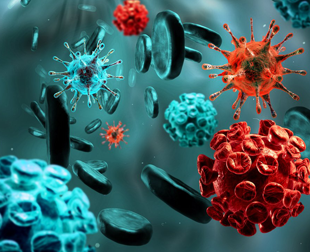


Lupus
 Lupus (systemic lupus erythematosus or SLE) is an autoimmune disease that causes the immune system to mistakenly attack healthy tissues, leading to inflammation, pain, swelling, and tissue destruction. Most patients with lupus experience symptoms in the joints of the hands, fingers, wrists, and knees. Lupus can also present with other symptoms, such as a characteristic rash, fatigue, swollen lymph nodes, and fever. While symptoms are usually treated with anti-inflammatory drugs, there is no known cure for Lupus.
Lupus (systemic lupus erythematosus or SLE) is an autoimmune disease that causes the immune system to mistakenly attack healthy tissues, leading to inflammation, pain, swelling, and tissue destruction. Most patients with lupus experience symptoms in the joints of the hands, fingers, wrists, and knees. Lupus can also present with other symptoms, such as a characteristic rash, fatigue, swollen lymph nodes, and fever. While symptoms are usually treated with anti-inflammatory drugs, there is no known cure for Lupus.
Crohn’s Disease
Crohn’s disease is an inflammatory bowel disease that affects the small bowel. Symptoms, which can range from mild to severe, often come and go and include bloating, abdominal pain, diarrhea, loss of appetite, and impaired absorption. As a result, weight loss and nutritional deficiencies are quite common. Scientists aren’t in agreement as to the exact cause of Crohn’s disease, but many experts believe it is an autoimmune disease. Patients are typically treated with anti-inflammatory drugs, diet changes, and, in severe cases, surgery to remove damaged sections of the colon.
Rheumatoid Arthritis
Like other types of arthritis, rheumatoid arthritis is a condition marked by inflammation in the joints. But unlike the more common osteoarthritis, which is caused by wear and tear on the cartilage that cushions the joints, rheumatoid arthritis is an autoimmune disease. The immune system attacks the joints, resulting in inflammation, irritation, and cartilage damage. Rheumatoid arthritis usually occurs in joints on both sides of the body. Common sites of swelling, pain, and redness include the hands, wrists, and knees, but other joints and organs may be affected. Treatments are aimed at quelling inflammation and halting disease progression, but new regenerative medicine approaches are also being explored.
AUTO-IMMUNE CONDITIONS AND ADIPOSE DERIVED MESENCHYMAL STEM CELLS
Adipose derived adult (non-embryonic) mesenchymal stem cells have been postulated to have the ability to seek out areas of injury and regeneration and assist in the repair of nerves, blood vessels, muscle, fat, cartilage, bone, and many other structures. These cells are naturally recruited by cytokines (SDF-1 stromal derived factor one, HGF hepatocyte growth factor, and platelets), to sites of inflammation, ischemia, hypoxia, or injury and they assist in the healing process either by directly forming needed cells or secreting chemical messengers that promote healing. Stem cells are mobilized naturally from bone marrow when the body is healing but they are also found in human adipose tissue. These stem cells from fat are abundant in levels of up to a thousand times greater than those found in bone marrow, and have equivalent regeneration potential to the bone marrow cells. The success of stem cell treatments appears to relate to the number of cells, giving adipose cells a significant potential advantage to regenerate human tissues. Mesenchymal stem cells have been used extensively around the world in the successful treatment of orthopedic, cardiac, pulmonary, and neurologic disease in both humans and veterinary models.
The regenerative medicine protocol for auto-immune conditions harnesses the anti-inflammatory, immuno-modulatory and regenerative properties of adult stem cells to repair and regenerate tissue. This protocol involves the patient’s own adult stem cells. Isolated from a small amount of fat, which is the richest source of stem cells and is obtained during a simple liposuction procedure, these cells are concentrated and infused back into the patient’s body via intravenous infusion.
Not all cases or patients respond to stem cell therapy and outcomes will vary from patient to patient.
Would you like to be contacted regarding potential regenerative medicine pilot studies? If so please fill out our Contact Form.
